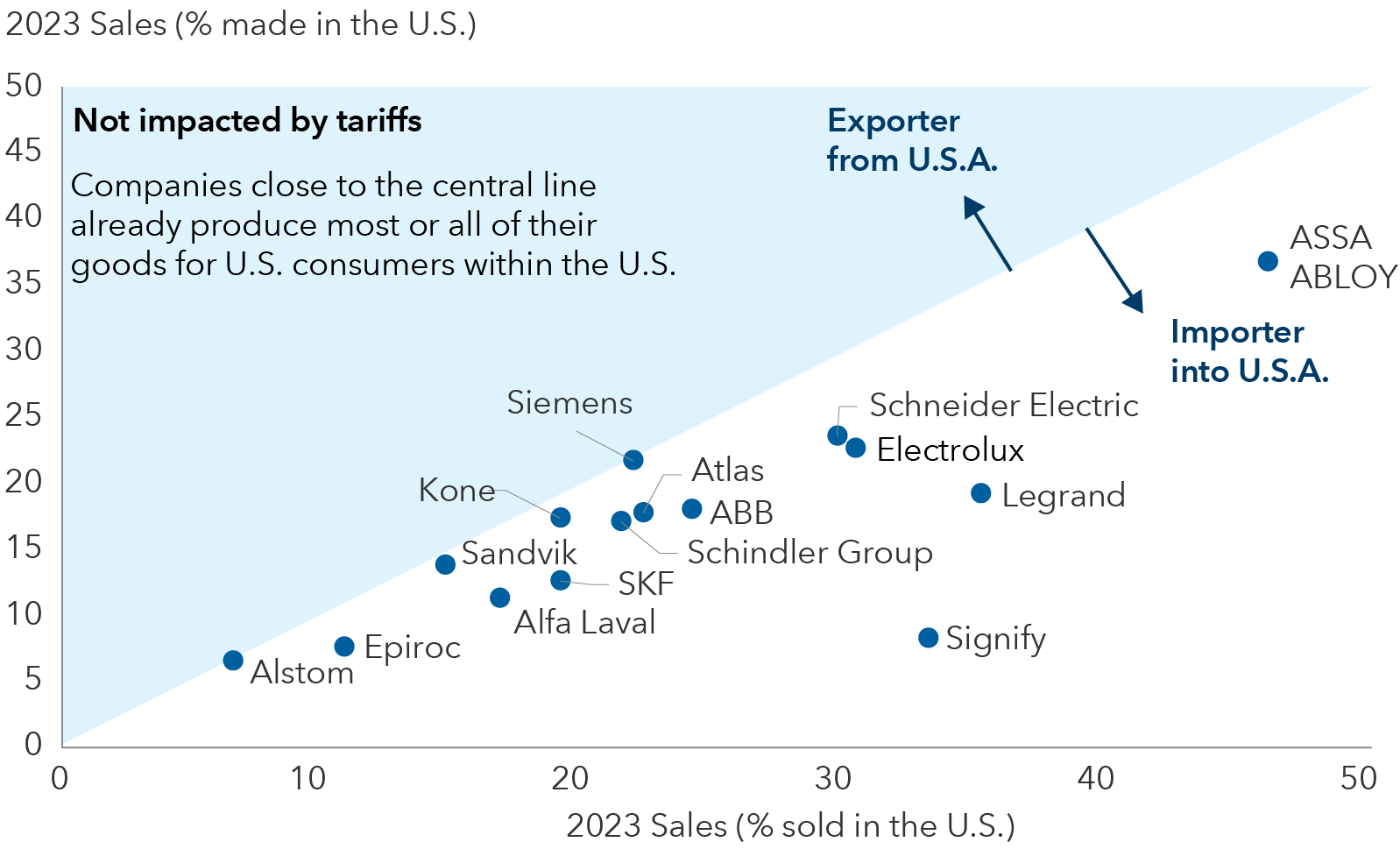Global Equities
Economic Indicators
As tariffs, trade wars and real wars upend the global economy, the path of equity markets remains uncertain heading into the second half of 2025.
Early progress in tariff negotiations with the U.K., China and India helped calm some of the market turbulence, but with the contours of the global trade landscape still evolving and growth slowing in the U.S., investors should brace for further bouts of volatility.
“I expect stock markets to be noisy in the coming months, because many companies are frozen in place until they have more clarity on where global trade is headed,” says equity portfolio manager Cheryl Frank. “But as the new trade landscape comes into focus, I expect markets to stabilize and a new set of investment opportunities to emerge.”
History doesn’t repeat, but often rhymes
Investors may take comfort in remembering that markets endured tariff-induced volatility in the not-so-distant past. During President Trump’s first term in office, a series of tariffs launched in 2018 sparked a trade war with China that whipsawed markets and dominated headlines, much like today. The S&P 500 Index reacted by falling 4.4% for the year (in U.S. dollar terms). But as the administration worked out trade deals and consumer spending remained steady, the index recovered sharply in 2019, rising 31.5%.
Markets recovered from trade uncertainty in Trump’s first term

Sources: Capital Group, U.S. Bureau of Labor Statistics, Peterson Institute for International Economics, Standard & Poor’s. Value of investment in the S&P 500 reflects the total return of the index over the period from January 1, 2018, to December 31, 2019. Values reflect USD.
Of course, past results are not predictive of future outcomes. The global economy is much different than it was in 2018, and today’s trade war is on a much bigger scale. But as Mark Twain wrote, “history doesn’t repeat itself, but it often rhymes.” And any further progress with negotiations could provide a strong tailwind for stocks.
“Trump’s first term shows the outcome can vary significantly from the initial headlines,” says Martin Jacobs, a portfolio manager for Capital Group U.S. Equity Fund™ (Canada). “As someone who believes the market tends to go up far more than it goes down, I am not discouraged by this year’s volatility. I view the dislocation as an opportunity to invest in great companies and multiyear investment trends where I have conviction, setting up the portfolios I manage for years to come.”
Multinationals go multi-local
Just as markets have proven resilient, well-run companies have been able to adapt to even the most challenging circumstances. Multinational companies, for example, may appear to be among the most vulnerable to the current trade headwinds. On the contrary, many are well positioned because they’ve navigated choppy trade waters for years.
“Many multinationals are developing a ‘multi-local’ approach to business, moving closer to customers in the countries where they operate,” says Jody Jonsson, equity portfolio manager.
In the latest example, German industrials giant Siemens opened a US$190 million manufacturing plant this year in Fort Worth, Texas. U.S. companies known for building their products overseas are taking the same approach. Apple recently announced it would spend US$500 billion on new U.S.-based facilities over the next four years.
That’s one way to get around U.S. tariffs. “We’ve seen that globally diversified, multinational companies have the flexibility, resources and management expertise to compete very effectively, even when the ground is shifting beneath their feet,” Jonsson explains.
Markets recovered from U.S. tariff policies in Trump’s first term

Sources: Capital Group, Redburn. Data based on internal company estimates as of 2023 sales. As of December 31, 2023.
Multinationals aren’t the only potential winners in today’s environment. Some domestic companies may also be positioned to weather today’s uncertain environment. For example, the once stodgy utilities sector has recently been flexing new growth potential. What’s more, domestic utilities are not subject to tariffs and have historically provided a measure of stability during down markets. “A number of trends, including the wider adoption of electric vehicles, the expansion of data centres and the onshoring of some manufacturing, are driving growth of the power grid that we have not seen in two decades,” Frank says.
For example, Constellation Energy, a U.S.-based provider of nuclear power, forged an agreement in June with tech giant Meta to supply power to its data centres in Illinois for the next 20 years. Similarly, electric and natural gas utility CenterPoint Energy is seeing demand for services rise with population growth in Texas and the construction of data centres.
Frank, who expects market leadership to broaden beyond the U.S. tech giants that dominated market returns through 2024, has also been looking for opportunities to invest in select financials, industrials and defence companies that could benefit from developing tailwinds.
New catalysts for growth outside U.S.
Just as companies have sought to adapt to a changing global order, so too have governments. German chancellor-to-be Friedrich Merz in March declared this to be a “whatever it takes” moment for Europe as Germany, known for fiscal austerity, announced a large fiscal stimulus package focused on defence and upgrading infrastructure.
“There is greater recognition in Europe that it needs to be self-sufficient when it comes to its own defence,” explains Samir Parekh, a portfolio manager for Capital Group U.S. Equity Fund™ (Canada). “This is likely to have positive ramifications for many companies.” While it will take some time for the stimulus to be implemented, it represents opportunity for companies related to defence, building materials and infrastructure. There’s also a sense that the regulatory environment may become more pro-investment and open to change as European leaders seek to boost growth.
Corporate reforms are ongoing in Japan and South Korea, and there are signs of stabilization in China. Thanks in part to a weaker U.S. dollar, non-U.S. stocks have enjoyed a strong 2025. Through June 5, the MSCI Europe, MSCI EAFE and MSCI ACWI ex USA indices have all outpaced the S&P 500.
International stocks have taken the lead

Sources: MSCI, RIMES, S&P Global. Data through June 5, 2025. Returns are in USD.
Security could be an enduring theme
As the U.S. and other nations redefine trade relationships and political alliances, governments around the world are taking steps to prioritize security, starting with national defence. Germany’s increased fiscal package includes a larger allotment for defence. In December 2024, Japan’s cabinet approved a 9.4% increase in its defence budget.
“The push for security extends beyond defence to the need for reliable energy sources, stable infrastructure and supply chains,” Parekh adds.
U.S. and Europe both seek to expand sources of traditional energy, as well as pursuing development of nuclear power and other alternatives. Along with these goals, the focus on supply chain and infrastructure security could represent growth opportunities for industrials. For example, global conglomerates like Mitsubishi Heavy Industries in Japan, Siemens Energy in Germany and GE Vernova in the U.S. offer products across power generation, grid modernization, defence systems and cybersecurity categories.
Security concerns in the spotlight

Sources: Capital Group, FactSet. Companies shown are among the largest constituents of their respective sub-industries within the MSCI All Country World Index and are meant to serve as examples of potential beneficiaries from investment across the various security applications listed. As of May 20, 2025.
Positioning portfolios for the future
The investment environment has transformed considerably since the start of the year, when markets reflected exuberance after the U.S. presidential election and U.S. tech giants focused on artificial intelligence generated the lion’s share of market returns. In the months since, risks to the economy and markets have increased, but opportunities are broadening. According to Frank, for long-term investors, it will be important to seek balance in portfolios and maintain flexibility.
“This year it is critical to remain nimble,” she says. “In periods of disruption, markets have tended to punish good companies as well as bad. So, a lot of companies will appear to be on sale. I will take these opportunities to determine where long-term value may lie. This can help lay the foundation for strong return potential in the years ahead.”
As turbulent as markets have been this year, circumstances appeared more dire during the COVID pandemic when industries like travel and restaurants seemed uninvestable. Many of those companies have since recovered. “Living through difficult periods can be unnerving,” Frank adds. “But our job as active managers is to be prepared and act with conviction when long-term opportunity arises.”
MSCI All Country World Index is a free float-adjusted, market capitalization-weighted index that is designed to measure equity market results in the global developed and emerging markets, consisting of more than 40 developed and emerging market country indexes.
MSCI ACWI ex USA Index is a free float-adjusted, market capitalization-weighted index that measures equity market results in the global developed and emerging markets, excluding the United States.
MSCI EAFE (Europe, Australasia, Far East) Index is a free float-adjusted, market capitalization-weighted index that is designed to measure developed equity market results, excluding the United States and Canada.
MSCI Europe Index is designed to measure the performance of equity markets in 15 developed countries in Europe.
MSCI Japan Index is designed to measure the performance of the large- and mid-cap segments of the Japanese market.
S&P 500 Index is a market capitalization-weighted index based on the results of approximately 500 widely held common stocks.
Source: MSCI. The MSCI information may only be used for your internal use, may not be reproduced or redisseminated in any form and may not be used as a basis for or a component of any financial instruments or products or indices. None of the MSCI information is intended to constitute investment advice or a recommendation to make (or refrain from making) any kind of investment decision and may not be relied on as such. Historical data and analysis should not be taken as an indication or guarantee of any future performance analysis, forecast or prediction. The MSCI information is provided on an “as is” basis and the user of this information assumes the entire risk of any use made of this information. MSCI, each of its affiliates and each other person involved in or related to compiling, computing or creating any MSCI information (collectively, the “MSCI Parties”) expressly disclaims all warranties (including, without limitation, any warranties of originality, accuracy, completeness, timeliness, non-infringement, merchantability and fitness for a particular purpose) with respect to this information. Without limiting any of the foregoing, in no event shall any MSCI Party have any liability for any direct, indirect, special, incidental, punitive, consequential (including, without limitation, lost profits) or any other damages. (www.msci.com)
Our latest insights
-
-
-
-
Markets & Economy
-
Global Equities
RELATED INSIGHTS
-
Global Equities
-
-
Markets & Economy
Commissions, trailing commissions, management fees and expenses all may be associated with investments in investment funds. Please read the prospectus before investing. Investment funds are not guaranteed or covered by the Canada Deposit Insurance Corporation or by any other government deposit insurer. For investment funds other than money market funds, their values change frequently. For money market funds, there can be no assurances that the fund will be able to maintain its net asset value per security at a constant amount or that the full amount of your investment in the fund will be returned to you. Past performance may not be repeated.
Unless otherwise indicated, the investment professionals featured do not manage Capital Group‘s Canadian investment funds.
References to particular companies or securities, if any, are included for informational or illustrative purposes only and should not be considered as an endorsement by Capital Group. Views expressed regarding a particular company, security, industry or market sector should not be considered an indication of trading intent of any investment funds or current holdings of any investment funds. These views should not be considered as investment advice nor should they be considered a recommendation to buy or sell.
Statements attributed to an individual represent the opinions of that individual as of the date published and do not necessarily reflect the opinions of Capital Group or its affiliates. This information is intended to highlight issues and not be comprehensive or to provide advice. For informational purposes only; not intended to provide tax, legal or financial advice. Capital Group funds are available in Canada through registered dealers. For more information, please consult your financial and tax advisors for your individual situation.
Forward-looking statements are not guarantees of future performance, and actual events and results could differ materially from those expressed or implied in any forward-looking statements made herein. We encourage you to consider these and other factors carefully before making any investment decisions and we urge you to avoid placing undue reliance on forward-looking statements.
The S&P 500 Composite Index (“Index”) is a product of S&P Dow Jones Indices LLC and/or its affiliates and has been licensed for use by Capital Group. Copyright © 2026 S&P Dow Jones Indices LLC, a division of S&P Global, and/or its affiliates. All rights reserved. Redistribution or reproduction in whole or in part are prohibited without written permission of S&P Dow Jones Indices LLC.
FTSE source: London Stock Exchange Group plc and its group undertakings (collectively, the "LSE Group"). © LSE Group 2026. FTSE Russell is a trading name of certain of the LSE Group companies. "FTSE®" is a trade mark of the relevant LSE Group companies and is used by any other LSE Group company under licence. All rights in the FTSE Russell indices or data vest in the relevant LSE Group company which owns the index or the data. Neither LSE Group nor its licensors accept any liability for any errors or omissions in the indices or data and no party may rely on any indices or data contained in this communication. No further distribution of data from the LSE Group is permitted without the relevant LSE Group company's express written consent. The LSE Group does not promote, sponsor or endorse the content of this communication. The index is unmanaged and cannot be invested in directly.
BLOOMBERG® is a trademark and service mark of Bloomberg Finance L.P. and its affiliates (collectively “Bloomberg”). Bloomberg or Bloomberg’s licensors own all proprietary rights in the Bloomberg Indices. Neither Bloomberg nor Bloomberg’s licensors approves or endorses this material, or guarantees the accuracy or completeness of any information herein, or makes any warranty, express or implied, as to the results to be obtained therefrom and, to the maximum extent allowed by law, neither shall have any liability or responsibility for injury or damages arising in connection therewith.
The MSCI information may only be used for your internal use, may not be reproduced or redisseminated in any form and may not be used as a basis for or a component of any financial instruments or products or indices. None of the MSCI information is intended to constitute investment advice or a recommendation to make (or refrain from making) any kind of investment decision and may not be relied on as such. Historical data and analysis should not be taken as an indication or guarantee of any future performance analysis, forecast or prediction. The MSCI information is provided on an “as is” basis and the user of this information assumes the entire risk of any use made of this information. MSCI, each of its affiliates and each other person involved in or related to compiling, computing or creating any MSCI information (collectively, the “MSCI Parties”) expressly disclaims all warranties (including, without limitation, any warranties of originality, accuracy, completeness, timeliness, non-infringement, merchantability and fitness for a particular purpose) with respect to this information. Without limiting any of the foregoing, in no event shall any MSCI Party have any liability for any direct, indirect, special, incidental, punitive, consequential (including, without limitation, lost profits) or any other damages. (www.msci.com)
Capital believes the software and information from FactSet to be reliable. However, Capital cannot be responsible for inaccuracies, incomplete information or updating of the information furnished by FactSet. The information provided in this report is meant to give you an approximate account of the fund/manager's characteristics for the specified date. This information is not indicative of future Capital investment decisions and is not used as part of our investment decision-making process.
Indices are unmanaged and cannot be invested in directly. Returns represent past performance, are not a guarantee of future performance, and are not indicative of any specific investment.
All Capital Group trademarks are owned by The Capital Group Companies, Inc. or an affiliated company in Canada, the U.S. and other countries. All other company names mentioned are the property of their respective companies.
Capital Group funds are offered in Canada by Capital International Asset Management (Canada), Inc., part of Capital Group, a global investment management firm originating in Los Angeles, California in 1931. Capital Group manages equity assets through three investment groups. These groups make investment and proxy voting decisions independently. Fixed income investment professionals provide fixed income research and investment management across the Capital organization; however, for securities with equity characteristics, they act solely on behalf of one of the three equity investment groups.
The Capital Group funds offered on this website are available only to Canadian residents.
 Cheryl Frank
Cheryl Frank
 Martin Jacobs
Martin Jacobs
 Jody Jonsson
Jody Jonsson
 Samir Parekh
Samir Parekh